- Ground Floor,114 - Shree Vividh Sarkari Karmachari Society-2, Near Rajnagar chowk, Nana Mava Main Road, Rajkot-360001
- CLINIC : +91 9558809909
Neuro-Muscular Dentistry (TMJ)
What are Neuro-Muscular Dentistry (TMJ)?
Having a balanced bite is essential for a healthy mouth. It impacts how you chew, speak and it allows your teeth to function properly. To put it simply, Neuromuscular Dentistry relaxes the muscles around the jaw to ease up tension in the joints. This is believed to improve jaw alignment and relieve temporomandibular disorders (TMD) and malocclusion, also known as a crossbite. While traditional dentistry evaluates primarily the teeth, bones, and gums, neuromuscular dentistry works with the hard tissues and the soft tissues, muscles, and nerves. Neuro-Muscular disorder literally means caused due to muscle impairment because of pathology in the associated nerves. These neuromuscular disorders have a collective lifetime prevalence rate of 3% to 5% which makes their encounter common with the dental practitioner. The ultimate cure to most headaches, migraines, facial pains, and temporomandibular joint disorder (TMD).
Before Understanding Neuromuscular Dentistry we must know TMJ?
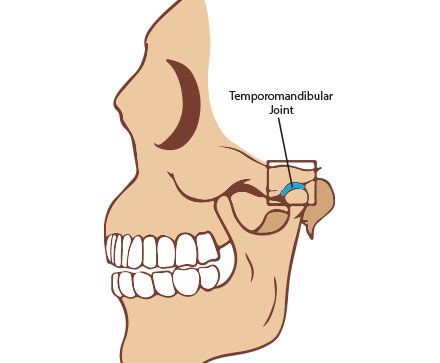
The actual position of the jaw is very complex. The facial muscles determine the function of the oral cavity and how the teeth come together. And over time, a person’s bite changes as they grow and develop. Relaxing the jaw muscles through neuromuscular therapy can stabilize the bite. This leads to less jaw pain and can help keep teeth aligned and intact.
The temporomandibular joint (TMJ) is the joint of the jaw It acts like a sliding hinge, connecting your jawbone to your skull. The TMJ is a bilateral synovial articulation between the mandible (lower jaw) and the temporal (lower lateral walls of the skull) bone. TMJ disorders or TMD can cause pain in your jaw joint and in the muscles that control jaw movement.
Sign and Symptoms of Neuro-Muscular Dentistry (TMJ)
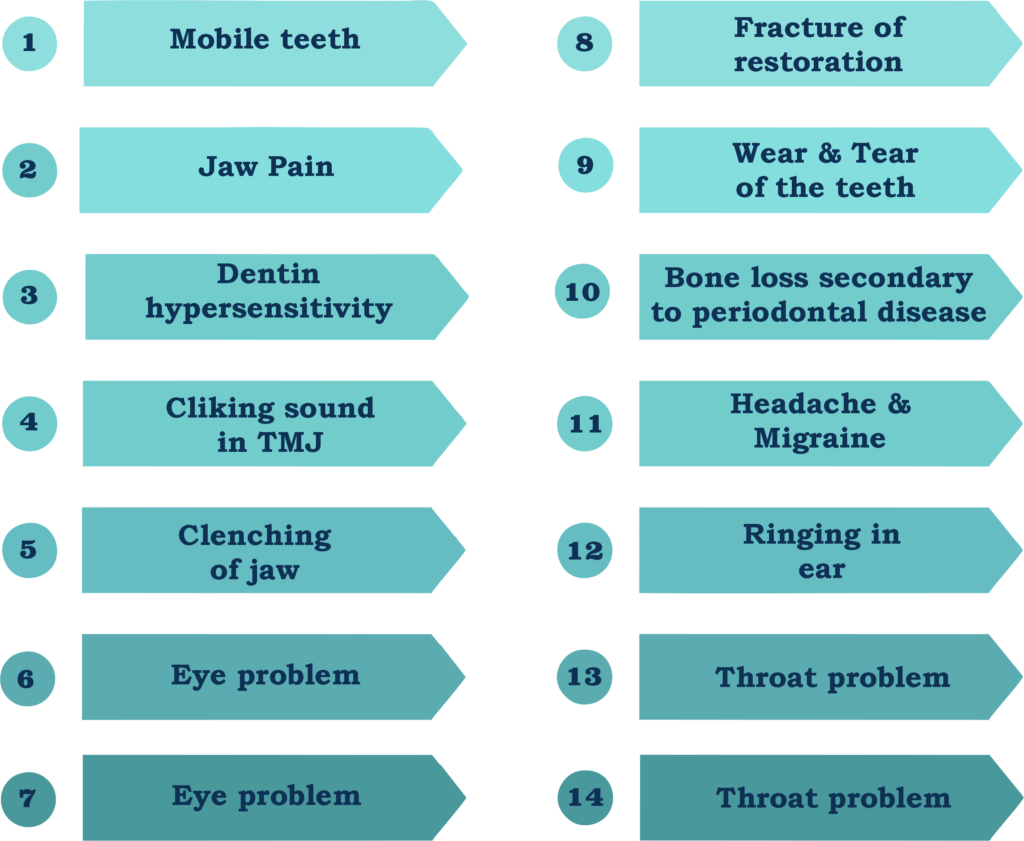
These problems are often caused by or are the result of Myofascial pain syndrome (MFP) and Temporomandibular disorder (TMD). TMD is a chronic degenerative disease where in patients suffer from an imbalance in the jaw to Skull relationship due to malocclusion or “bad bite”.
Dental Occlusion, Posture and Neuromuscular Diseases
TMJ is link to the cervical and scapular region by the neuromuscular system so any postural changes of the head and body can have an adverse effect on TMJ and can cause TMD. Also, alteration in masticatory muscles can cause changes in the head posture and vice versa. Therefore, manipulation of the muscles of the mandible can result in alterations in the usual head posture.
There is also a positive correlation between dental occlusion (vertical occlusal dimension) and head and neck posture. Dental Occlusion can have a detrimental effect on the general health of the patient in the long run. Moreover, occlusal position affects postural activities significantly. Pain and tired facial and masticatory muscles or TMJ pain is the most common symptom associated with occlusal disease. To measure occlusion and posture, techniques like surface electromyography, kinesiography, posture platform, etc. can be used.
Sign and Symptoms of Dental Occlusion
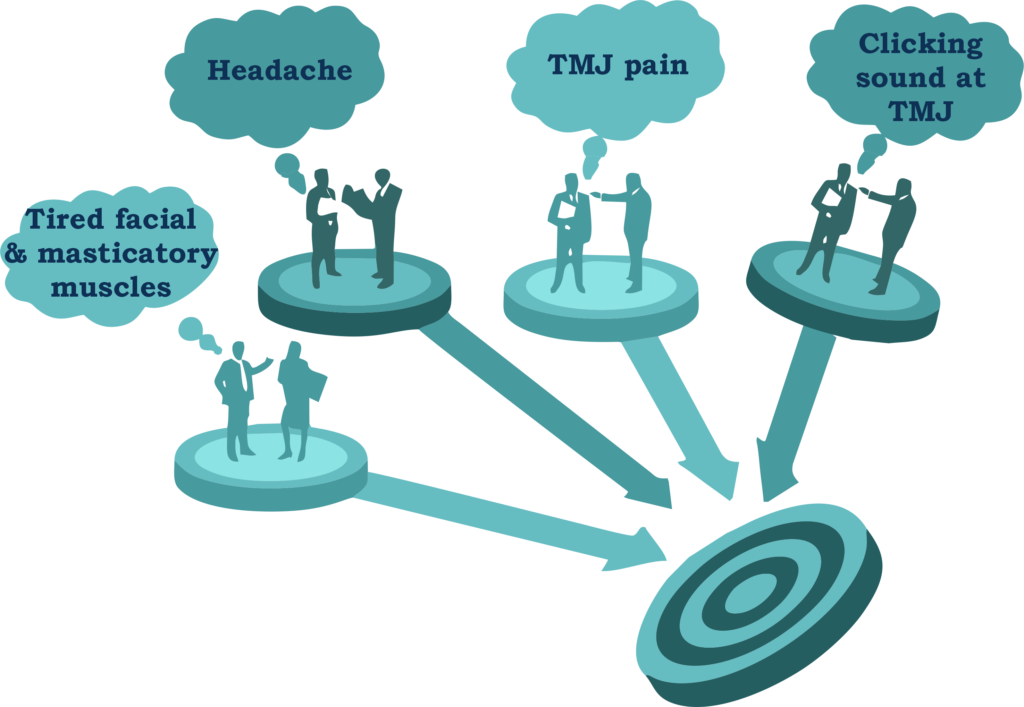
Factors Influences Neuro-Muscular Disease (TMJ)
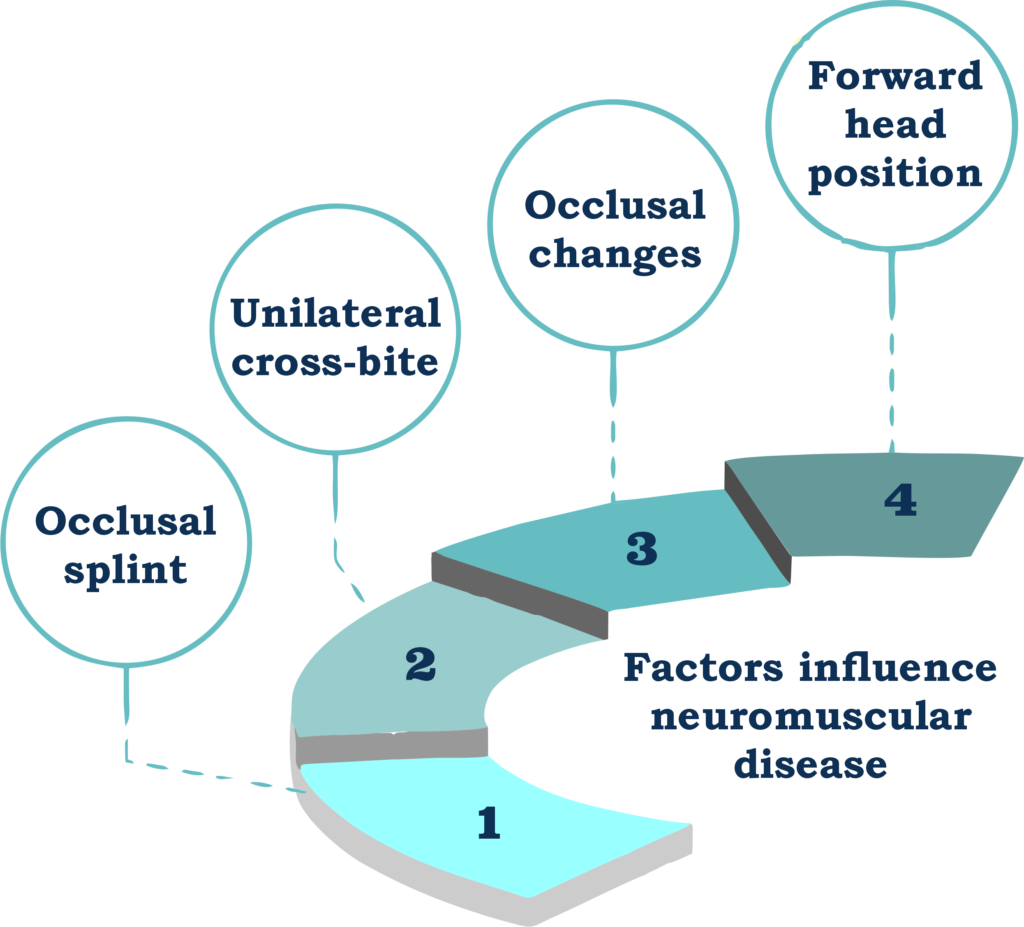
Neuro-Muscular Dentistry Disagnosis
Neuromuscular dentists do not rely only on X-rays or digital radiographs, which reveal the condition and position of the jaw joints. Other diagnostic technologies help them in determining the perfect position of a person’s jaw so as to relieve them from TMD symptoms.
Transcutaneous electrical nerve stimulation. Also known as TENS, electrical stimuli are administered to the muscles to relieve muscle spasms.
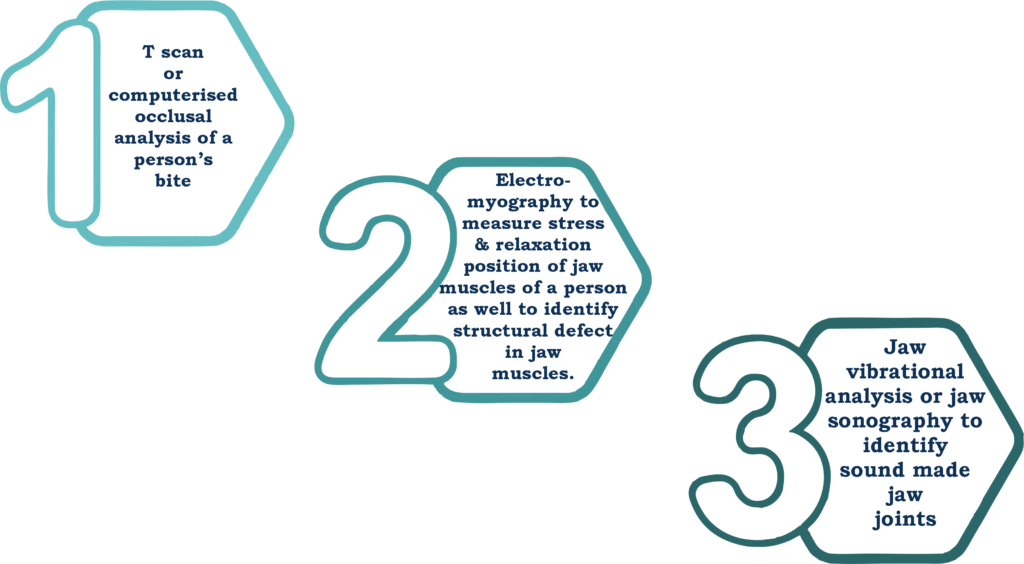
How to Treat
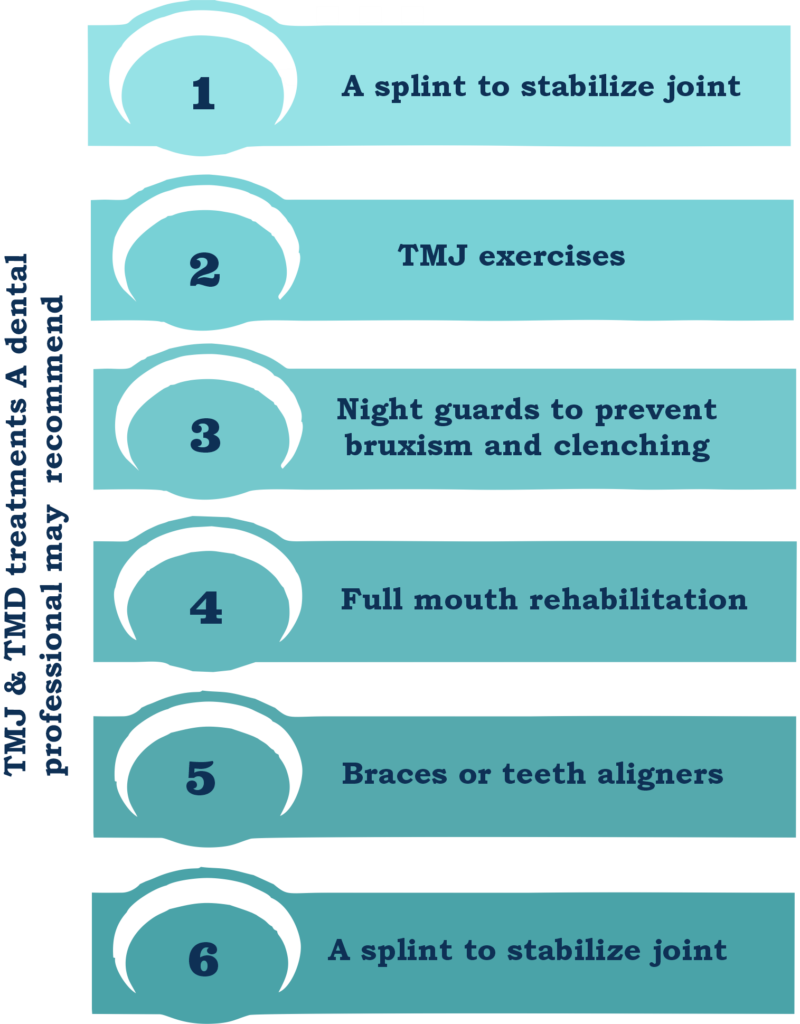
Jaw realignment may be irreversible, and orthodontic and prosthodontic measures should always be carefully considered. TMD can lead to severe conditions, such as headaches, poor posture, shoulder and neck pain, and a general detriment to the patient’s well-being.
Jaw pain, in many situations, can be managed with non-invasive treatments. Tests and imaging may rule out any potential pathology, but tests do not determine if the jaw position is the problem. Inflammation is usually present if these is acute pain. The acute pain can be managed by a dentist and may involve taking anti-inflammatory medications.
Neuromuscular Dentistry is one of many treatment options depending on the severity of the symptoms.
When to get a Dental Consultation?
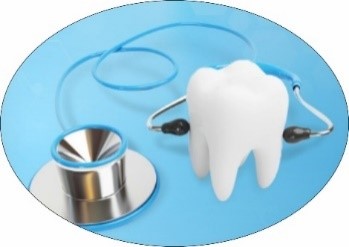
A small number of dentists have formal university training in Neuro-Muscular Dentistry. Seek a dental specialist’s advice if you experience signs of a chronic temporomandibular disorder.
Innovative Dental Care – Dr. Chirag Bhalu has been one of the pioneers in introducing neuromuscular dentistry, with the primary objective of correcting the alignment of the jaws and the bite of the teeth. Our Neuro-Muscular Dentistry place the jaw in its best-suited position, thereby relieving patients from the various problems associated with TMD. We create a balance between teeth, gums and bones, muscles and joints and nerves, unlike traditional dentistry that focuses on teeth alone. Through this branch of dentistry, we deal with typically all the functions of the mouth, which include swallowing, yawning, singing, chewing, biting, and speaking.
When to see a TMJ Specialist?
You must visit a TMJ specialist in Rajkot, if you have TMJ disorder symptoms such as pain or tenderness in your jaw, or if you can’t open or close your jaw completely. If you are wondering “is there a TMJ specialist near me?” you must visit Innovative Dental Care – Dr. Chirag Bhalu as soon as possible for a TMJ treatment consultation and effective neuromuscular disorder treatment.
Signs and Symptoms of TMJ Disorders

Factors that increase the Risk of Developing TMJ Disorders
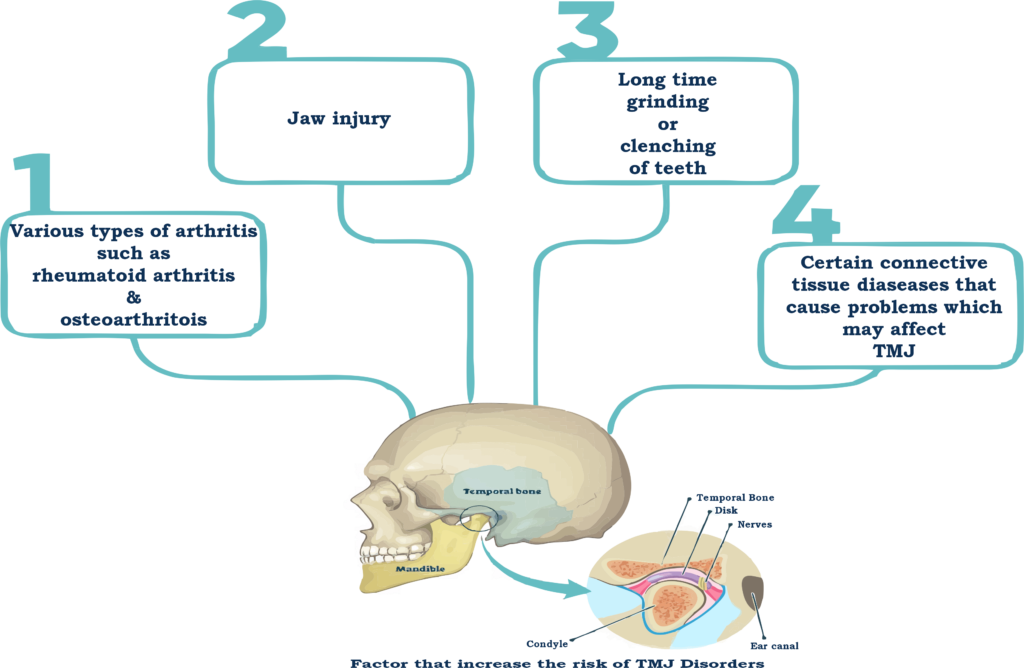
Causes for TMJ Disorder
The temporomandibular joint combines a hinge action with sliding motions. The parts of the bones that interact in the joint are covered with cartilage and are separated buy a small shock-absorbing disk, which normally keeps the movement smooth.
Painful TMJ disorders can occur if:

What is the Cost?
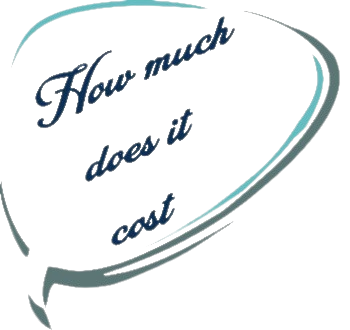
The cost of a neuromuscular procedure caries greatly. Cost of treatment in the United States can have a wide range depending on several factors. Treatment may exceed a year if a dental specialist recommends a full mouth reconstruction and insurance may not cover the cost of Neuro-Muscular Dentistry because there is little scientific evidence backing the effectiveness of the practice.
Frequently Asked Questions
A TMJ specialist can help you determine the source of your jaw pain, diagnose TMD, and treat the root causes of your condition. A TMJ Dentist is a dental who is trained in general dentistry but continues their education with a focus on the temporomandibular joint and its disorders. They spend their days treating general dental conditions, however, much of their efforts are spent diagnosing, managing, and treating TMJ disorders.
Treatment form an orthodontist can alleviate TMJ symptoms in many cases. It your TMJ comes from teeth grinding or cleaning, your dentist may recommend that you wear a custom dental appliance. Often called a bite plate or a splint, tis appliance will keep your upper teeth from grinding against your lower teeth.
Treatment form an orthodontist can alleviate TMJ symptoms in many cases. It your TMJ comes from teeth grinding or cleaning, your dentist may recommend that you wear a custom dental appliance. Often called a bite plate or a splint, tis appliance will keep your upper teeth from grinding against your lower teeth.
Our Services
Quick Contacts
- Phone : +91 9558809909
- Email : innovativedentalcare4u@gmail.com
- Address : Ground Floor,114 - Shree Vividh Sarkari Karmachari Society-2, Near Rajnagar chowk, Nana Mava Main Road, Rajkot-360001
- Copyright 2023. Innovative Dental Care
- Design and Developed by Illusio Designs
